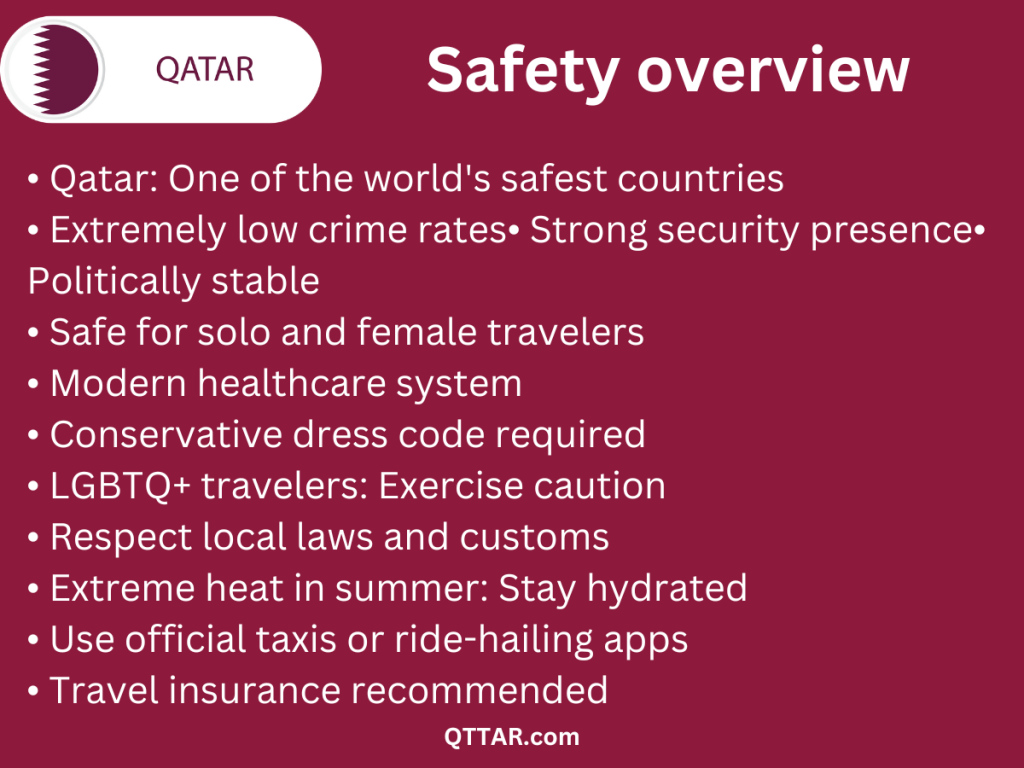Is Qatar Safe to Travel?
Qatar, a small but wealthy nation on the Arabian Peninsula, has been gaining attention as a travel destination in recent years. With its modern skyline, rich cultural heritage, and hosting of major events like the 2022 FIFA World Cup, many travelers are curious about visiting this Gulf state. However, safety concerns often arise when considering travel to the Middle East.
This comprehensive guide will address the question “Is Qatar safe to travel?” and provide detailed information to help you plan your trip with confidence.
Safety Overview
Qatar is generally considered one of the safest countries in the world. In fact, it occasionally ranks as the safest place on the entire planet according to various global safety indices. The crime rate is exceptionally low, and violent crimes against tourists are extremely rare. However, as with any travel destination, it’s essential to be aware of local laws, customs, and potential risks to ensure a smooth and enjoyable visit.
Crime Rates
Qatar boasts remarkably low crime rates compared to many other countries:
- Violent crime is extremely rare
- Petty theft and pickpocketing are uncommon but can occur in crowded areas
- Scams targeting tourists are less prevalent than in many other popular destinations
Terrorism Risk
While the threat of terrorism can never be completely ruled out in any country, Qatar has a strong security presence and has not experienced significant terrorist incidents:
- The UK Foreign Office states that terrorist attacks in Qatar can’t be ruled out but are not common
- Qatar has robust security measures in place, particularly in public areas and at major events
Political Stability
Qatar is a politically stable country with a strong central government:
- The country has not experienced significant civil unrest or political violence
- Regional tensions, such as the diplomatic crisis with neighboring countries in 2017, have largely been resolved
Travel Advisories
It’s always wise to check official travel advisories before visiting any country. Here’s what some major governments say about travel to Qatar:
United States
The U.S. State Department currently advises citizens to exercise normal precautions when traveling to Qatar, which is their lowest level of travel advisory.
United Kingdom
The UK Foreign, Commonwealth & Development Office (FCDO) does not advise against travel to Qatar and states that most visits are trouble-free.
Canada
The Government of Canada advises normal security precautions for Qatar, similar to the U.S. advisory.
Australia
The Australian Government’s Smartraveller website advises exercising normal safety precautions in Qatar.
Safety for Women Travelers
Qatar is generally considered safe for female travelers, but there are some cultural considerations to keep in mind:
Cultural Norms
- Qatar is an Islamic country with conservative social norms
- Women should dress modestly, covering shoulders and knees in public
- Public displays of affection between men and women are frowned upon
Solo Travel
Many women report feeling safe traveling alone in Qatar, but it’s wise to take standard precautions:
- Use reputable taxi services or ride-hailing apps
- Be cautious when walking alone at night, especially in less populated areas
- Stay in well-reviewed accommodations in safe neighborhoods
Legal Considerations
- Sexual assault and rape are rare but do occur
- Qatari law places a high burden of proof on victims in sexual assault cases
- Victims of sexual assault should contact their embassy for guidance and support
LGBTQ+ Travelers
Qatar’s stance on LGBTQ+ rights is an important consideration for travelers:
- Homosexuality is illegal in Qatar
- Same-sex relationships can lead to severe legal consequences
- LGBTQ+ travelers should exercise extreme caution and discretion
While many LGBTQ+ travelers visit Qatar without incident, it’s crucial to be aware of the legal and social risks involved.
Health and Medical Safety
Qatar has a modern healthcare system, but there are some health considerations for travelers:
Healthcare Facilities
- Qatar has world-class medical facilities, particularly in Doha
- Emergency medical care can be expensive, so travel insurance is strongly recommended
Common Health Risks
- Extreme heat in summer months (June to September) can pose health risks
- Dehydration and heat exhaustion are common concerns for visitors
- Foodborne illnesses can occur, but food safety standards are generally high
Vaccinations
The CDC and WHO recommend the following vaccinations for travel to Qatar:
- Routine vaccines (MMR, DPT, etc.)
- Hepatitis A and B
- Typhoid
- Rabies (for some travelers)
Road Safety
Driving in Qatar can be challenging for visitors due to local driving habits and road conditions:
Traffic Rules
- Driving is on the right-hand side of the road
- Seatbelts are mandatory for all passengers
- Using a mobile phone while driving is illegal
Road Conditions
- Major roads and highways are generally in excellent condition
- Traffic in Doha can be congested, especially during rush hours
- Aggressive driving and speeding are common issues
Driving Tips
- Consider using taxis or ride-hailing services instead of renting a car
- If driving, be extra cautious and defensive
- Avoid driving outside urban areas at night
Natural Disasters and Environmental Hazards
Qatar is not particularly prone to natural disasters, but there are some environmental considerations:
Sandstorms
- Occasional sandstorms can reduce visibility and air quality
- Stay indoors and close windows during sandstorms
Extreme Heat
- Summer temperatures can exceed 50°C (122°F)
- Take precautions to avoid heat-related illnesses
Coastal Hazards
- Rip currents can be dangerous for swimmers
- Follow local advisories and swim only in designated areas
Laws and Customs
Understanding and respecting local laws and customs is crucial for a safe and trouble-free visit to Qatar:
Alcohol Consumption
- Alcohol is only available in licensed hotels and restaurants
- Public intoxication is illegal and can result in arrest
- The legal drinking age is 21
Dress Code
- Both men and women should dress modestly in public
- Avoid revealing or tight-fitting clothing
- Beachwear is only acceptable at hotel beaches and pools
Photography
- Be cautious when taking photographs, especially of government buildings or military installations
- Ask permission before photographing local people
Ramadan
During the holy month of Ramadan, additional considerations apply:
- Eating, drinking, or smoking in public during daylight hours is prohibited
- Many restaurants and shops may have reduced hours
- Be respectful of those who are fasting

Common Scams and Risks
While scams are less common in Qatar than in many other tourist destinations, it’s still wise to be aware of potential risks:
Taxi Scams
- Use only official taxis or reputable ride-hailing apps
- Agree on the fare before starting the journey if the taxi is not metered
Pickpocketing
- Be vigilant in crowded areas and tourist spots
- Keep valuables secure and out of sight
Cybercrime
- Use secure Wi-Fi networks for sensitive transactions
- Be cautious when using public computers or ATMs
Emergency Services
Qatar has efficient emergency services, but it’s important to know how to access them:
- General Emergency Number: 999
- Police: 999
- Ambulance: 999
- Fire Department: 999
Store these numbers in your phone and know how to call for help if needed.
Travel Insurance
Travel insurance is highly recommended when visiting Qatar:
- Ensure your policy covers medical emergencies and evacuation
- Check if your policy includes coverage for adventure activities if you plan to participate in them
- Consider adding coverage for trip cancellation or interruption
Cultural Sensitivity
Being culturally sensitive is not just about respect; it also contributes to your safety:
Religious Customs
- Respect Islamic practices and customs
- Be mindful of prayer times and reduced business hours during religious holidays
Social Etiquette
- Use your right hand for eating and greeting
- Ask permission before taking photos of people, especially women
Language
- Learning a few basic Arabic phrases can be helpful and appreciated
- English is widely spoken, especially in tourist areas and businesses
Safe Areas to Visit
Qatar offers many safe and interesting places to visit:
Doha
- The capital city is modern and generally very safe
- Popular attractions include the Museum of Islamic Art and Souq Waqif
The Pearl-Qatar
- An artificial island with luxury shopping and dining
- Known for its beautiful marina and beaches
Katara Cultural Village
- A hub for art and cultural activities
- Safe and family-friendly environment
Al Zubarah Archaeological Site
- A UNESCO World Heritage site
- Well-preserved example of an 18th-century pearl fishing town
Areas to Exercise Caution
While most of Qatar is safe, there are some areas where extra caution is advised:
Industrial Areas
- Some industrial zones may have higher crime rates
- Exercise caution if visiting these areas, especially at night
Remote Desert Areas
- Always travel with a guide when venturing into the desert
- Ensure you have adequate supplies and communication devices
Safety Tips for Qatar Travel
To ensure a safe and enjoyable trip to Qatar, follow these general safety tips:
- Respect local laws and customs
- Dress modestly in public areas
- Stay hydrated and protect yourself from the sun
- Use reputable transportation services
- Keep valuables secure and out of sight
- Be cautious when using ATMs or handling money in public
- Stay informed about current events and any travel advisories
- Register with your embassy or consulate before traveling
- Carry a copy of your passport and keep the original in a safe place
- Purchase comprehensive travel insurance
Comparison with Other Gulf Countries
To provide context, here’s a comparison of safety levels in Qatar and other Gulf countries:
| Country | Safety Ranking (Global Peace Index 2021) | Notable Safety Concerns |
|---|---|---|
| Qatar | 29th | Conservative laws, extreme heat |
| UAE | 52nd | Petty crime in tourist areas |
| Oman | 73rd | Road safety issues |
| Kuwait | 36th | Regional political tensions |
| Bahrain | 99th | Occasional civil unrest |
| Saudi Arabia | 129th | Strict religious laws, regional conflicts |
Gulf Countries in the 2023 Global Peace Index
- Qatar: Ranked 21st globally (Score: 1.524, Increase 1 position)
- Kuwait: Ranked 35th globally (Score: 1.669, Increase 3 positions)
- United Arab Emirates: Ranked 75th globally (Score: 1.979, Increase 3 positions)
- Oman: Ranked 48th globally (Score: 1.794, Increase 18 positions)
- Bahrain: Ranked 108th globally (Score: 2.145, Increase 1 position)
- Saudi Arabia: Ranked 119th globally (Score: 2.260, Increase 5 positions)

Ammara Abdullah is an experienced writer and editor specializing in technology and digital trends. With over 5 years of experience, she produces insightful articles on emerging tech, consumer electronics, and digital culture. Ammara holds a degree in journalism and is passionate about making complex topics accessible to readers.






